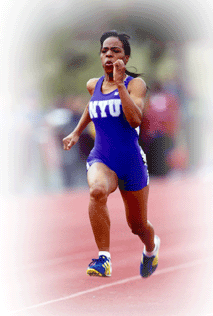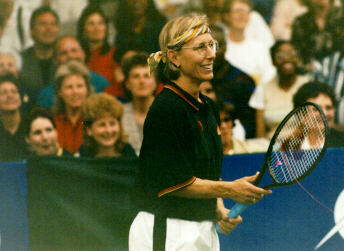Playing out identity
Part
2: How women athletes deal with homosexuality
In the
past, both Billy
Jean King and Martina
Navratilova lost sponsorship and public support over the
publicity surrounding the exposure of their personal lives.
However, both have regained acceptance. King has gone on to
help found Women's
Sports Foundation and Navratilova is once again endorsing
products, such as the Visa Rainbow Card, which has raised
over $1 million for gay and lesbian causes and won sponsorship
from British Airways and Subaru.
Among
athletes, viewpoints vary on how important it is to be "out"
in women's sports.
Fae Gibson, NYU track team member and star shot putter,
thinks that the athletic world is a haven for lesbian and
bi-sexual women, and can play an important role in their social
lives.
|

Fae Gibson.
|
"For
some reason, it seems that athletic women are more sexually
inclined towards other women. It's just kind of where [lesbians]
gather and find camaraderie. It's a way to express your sexuality,"
said Gibson, who has been "out" since 12th grade. Although
her athletic involvement played no direct role in her coming
out, she said, it can be a source of support.
"In many
cases it's a safe place for lesbians who deal with discrimination
every day, just like straight women have to survive a barrage
of stereotypes in the sports world. Sometimes straight girls
have to defend themselves from other men and women who make
assumptions about their sexuality and equate their athleticism
with masculine behavior," Gibson said. "Just by speaking with
my straight friends I know they go out of their way to be
overly feminine when they're not on the field.But
I don't think that 'oh, I hope I look girly enough,' comes
into their mind on the field."
Despite
the potential support system, Gibson is well aware of the
difficulties in being the outsider on a sports team. "I was
the only lesbian on the basketball team, it was really hard,"
she said of her freshman year experience. "They would make
comments, nothing derogatory, but it made me feel really uncomfortable."
A swimmer,
"out" since the age of 14, remembers the hardships she endured
in high school. "The locker room was always a messy situation
because it was about girls getting naked," she said.
| "The
other girls would scream all kinds of bloody murder and
'dyke'" |
"Before
swim team practice, I'd always have to get suited up in a
separate section. Otherwise, the other girls would scream
all kinds of bloody murder and 'dyke' and 'uh oh, she's looking
at me.'"
"...I
had a girlfriend and it was well-known who she was," she continued.
"So it was straight-up homophobia run amok. It happens to
everyone who comes out in an unsafe environment."
Gibson
stresses the importance of a supportive coach and team for
"out" athletes. Now it's important for her and her lesbian
friends to scout out "new recruits," to help prevent other
lesbian players from experiencing alienation.
"We're
looking for a common bond," Gibson said. "It's like a little
community and you want to find people like you who are comfortable
around each other. It's nice for people to find a clique to
hang out with, where they can be themselves. It's a conscious
decision that woman make to get into athletics, meanwhile
for boys it's a natural thing to do in their spare time. Women
are up against more obstacles so the thrill of victory is
all that more powerful."
At 21,
Tania Vikki is a first-degree black belt in karate and a lesbian.
Although her experience of the sport world has not been so
nurturing to her sexual identity, she has overcome another
aspect of the same stereotype -- one that deals with women's
motivation for getting involved in sports.
"I don't
think I would feel comfortable coming out to a dojo. Karate
is very individualized. I would be worried that people would
have biases that they would take out on me during sparing,
or they wouldn't want to partner up with me because of me
of it."
Because
of the high-impact and solitary nature of karate, Vikki cites
many reasons why coming out in a dojo could be more trouble
than it is worth.
"I had
my suspicions [about who was gay]," said Vikki, "but I never
asked. With guys it's a macho sport. If you're a gay male
coming out could have a lot more consequences during sparing.
As women, we already have so much against us, why would you
want to enhance that by coming out of the closet? Or even
give men a reason to now see you as different from other women
and think it's okay to be more aggressive with you. It's a
place where guys act more macho than they would usually be
and macho guys are intimidated by lesbians." What Vikki is
most bothered by is that idea that while men get involved
in karate to fight, women go to learn self-defense.
| "For
women it's all about being defensive and protecting yourself"
|
"Men
are there to learn how to fight because they're supposed to
know how to protect people. For women, it's all about being
defensive and protecting yourself. I took karate because I
wanted to learn how to fight. A lot of the women in my dojo
were sturdy, strong women who were just there to kick ass."
Andra
Douglas of the NY Sharks has found that this rings true among
her fellow players. She said that there are three main motivating
factors among her players, and that they overlap.
"Some
women want to get out there and play, some want to make history
and some people want to get out there and hit someone," Douglas
said. "The uniting motivation is to get out there and do something
we've been denied."
"People
really need to open their minds and their hearts and give
women a chance," she said. "America is so puritanical anyway,
people should just put sex out of it and let us play a game
that we are good at."
|






